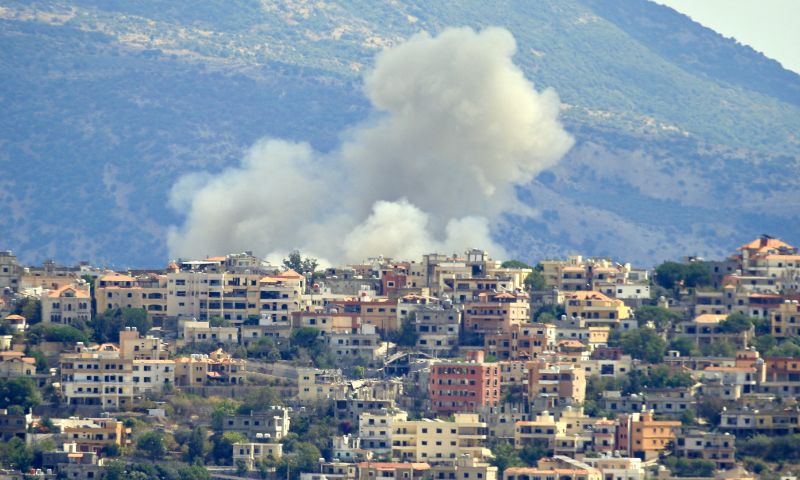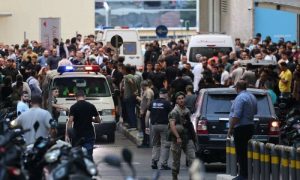BEIRUT: Israel launched airstrikes on Hezbollah strongholds in southern Lebanon on Thursday following two waves of communication device explosions that killed at least 37 people, including two children, and injured more than 2,900 others across Lebanon.
Israel has not commented on the explosions in which Hezbollah operatives’ pagers and walkie-talkies exploded in supermarkets, on streets and at funerals. The blasts are believed to be unprecedented in their impact and scale, raising tensions in the region significantly.
The explosions occurred over two days, with devices hidden in pagers and walkie-talkies detonating in various locations, including supermarkets, streets, and even funerals. Hezbollah has accused Israel of orchestrating the attacks. The Lebanese group’s leader, Hassan Nasrallah, is expected to address the situation in a speech later today.
Israel has not officially commented on the blasts, but hours before the explosions on Wednesday its defence minister, Yoav Gallant, warned of a shift in military focus towards the north, stating, “The centre of gravity is moving northward. We are at the start of a new phase in the war.”
Israeli troops have been engaged in near-daily fire exchanges with Hezbollah along its northern border, killing hundreds in Lebanon and dozens in Israel. The exchanges of fire have forced tens of thousands of people on both sides of the border to flee their homes.
On Thursday, the Israeli military targeted six Hezbollah infrastructure sites and a weapons storage facility overnight, further escalating tensions. The strikes were confirmed by Lebanon’s National News Agency, which reported heavy shelling in several towns in the southern region.
Rattled by the deadly attacks that targeted its communication system, Hezbollah said Israel was “fully responsible for this criminal aggression” and vowed revenge. On Thursday, the group reported that 25 of its members were killed in the blasts, saying at least 20 had died when their walkie-talkies exploded.
Lebanon’s Foreign Minister, Abdallah Bou Habib, condemned the attacks as a blatant assault on the country’s sovereignty, warning that it could signal a broader regional war. Prime Minister Najib Mikati called on the United Nations to intervene against what he termed Israel’s “technological war.”
The international community is closely monitoring the situation. Iran’s envoy to the UN has said that Iran reserves the right to retaliate following the injuries sustained by its ambassador in Beirut during the explosions.
In the United States, National Security Council spokesman John Kirby cautioned against further military escalation, emphasizing that a solution to the ongoing crisis requires diplomacy, not additional operations. “We don’t believe that the way to solve where we’re at in this crisis is by additional military operations at all,” Kirby said.
Since October 7, Israel has launched a relentless bombardment campaign in Gaza killing at least 41,272 Palestinians, most of them civilians, according to data provided by the territory’s health ministry. The UN has acknowledged these figures as reliable.
In Gaza on Wednesday, the civil defence agency said an Israeli strike on a school-turned-shelter killed five people. The Israeli military said it targeted Hamas militants.
Hospitals in Beirut struggled to manage the influx of casualties and medical professionals reported horrific injuries, with many victims suffering from severe shrapnel wounds and loss of limbs. Dr. Joelle Khadra noted that injuries were primarily to the eyes and hands, describing the situation as unprecedented.
Analysts said operatives had likely planted explosives on the pagers before they were delivered to Hezbollah.
Preliminary investigations in Lebanon have revealed that the devices used in the explosions were likely booby-trapped before reaching Hezbollah. A security official said that the pagers contained explosive materials designed to detonate upon activation, raising questions about the procurement and security of the devices.
“Data indicates the devices were pre-programmed to detonate and contained explosive materials planted next to the battery,” the official said, requesting anonymity to discuss sensitive matters.
After The New York Times reported that the pagers that exploded on Wednesday had been ordered from Taiwanese manufacturer Gold Apollo, the company said they had been produced by its Hungarian partner BAC Consulting KFT.
A government spokesman in Budapest said the company was “a trading intermediary, with no manufacturing or operational site in Hungary”.
Japanese firm Icom said it had stopped producing the model of radios reportedly used in Wednesday’s blasts in Lebanon around 10 years ago.























